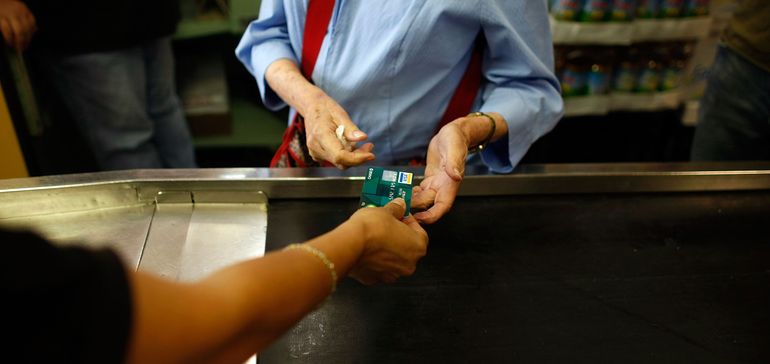As card giants, payments processors and fintechs report quarterly results in coming weeks, the reports will show how a difficult economy has impacted their customers.
Over the next five weeks, card issuers and networks, fintechs and payments processors will share key data on consumer spending and payment volume, credit metrics such as delinquencies and charge-offs, merchant and bank technology trends — all of which is colored by inflation, rising interest rates and concerns of higher unemployment.
For instance, PayPal is expected to be impacted by consumers’ discretionary spending pullback and the stagnation of e-commerce. If small business owners are hurting, that could affect merchant service providers including Block’s Square and Fiserv’s Clover.
At card issuers American Express and Discover, inflation and rising interest rates may result in higher charge-off rates and delinquencies.
Visa, Mastercard, Amex, Discover
As consumer demand declined in the fourth quarter, consumer payments volume growth slowed for credit and debit card issuers, suggesting the biggest U.S. card networks, Visa and Mastercard will also be negatively impacted. Those card networks report their quarterly earnings Jan. 26.
Visa and Mastercard are likely to report slower volume growth for the quarter, although consumer spending remained somewhat healthy, Bank of America analyst Jason Kupferberg wrote in a Jan. 19 note to investor clients.
The two likely benefited from rising cross-border activity during the quarter, and foreign exchange volatility potentially bolstered cross-border revenue for Visa in particular, Kupferberg said.
Discover Financial Services was the first card company to report Q4 earnings on Jan. 19. Its net charge-off rate ticked up to 2.13% in the quarter.
“Consumers are starting to significantly increase their revolve rates, likely indicating pressure,” Oppenheimer & Co. analyst Dominick Gabriele wrote in a Jan. 18 note to investor clients.
Discover also increased its credit loss provisions to $883 million as of the end of the fourth quarter, according to its filing with the Securities and Exchange Commission, up from $773 million in the third quarter.
Like Discover, American Express has said rising unemployment is strongly linked to consumers struggling to pay their bills. Amex, which reports Q4 earnings Jan. 27, benefits from higher-income customers, but the company will still see consumer credit losses rise because unemployment is likely to climb, Gabriele said.
Amex may face some scrutiny over expenses, but the company’s focus on marketing and customer engagement spending “really gives them a lever to pull” when needed, Gabriele said.
PayPal, Affirm, Block
Digital payments giant PayPal has been under the microscope in recent months: It’s grappled with C-suite changes, missed growth goals in recent years and now faces an e-commerce slump.
Amid intense checkout competition, acting CFO Gabrielle Rabinovitch said in December the company is holding or modestly gaining market share – although analysts are skeptical of that based on holiday spending data.
“Debates around market share/competition for (PayPal) have escalated,” Kupferberg wrote in a Jan. 18 note to investor clients. Analysts expect more details on market share metrics during the company’s Feb. 9 earnings call.
For buy now, pay later provider Affirm, Bank of America analysts downgraded the company’s stock late last year, noting the company has significant exposure to consumer credit risk and lower-income consumer spending. Affirm, which recently scrambled to address a technical glitch that left users with duplicative charges, also faces concerns related to loan funding.
Kupferberg said he’s employing “a somewhat low bar” when the company reports earnings in February.
Consumer expenditures ebbing in the quarter may have stressed digital payments company Block more than payment peers, given its ties to lower-income consumers through its Cash App product or BNPL through Afterpay, analysts noted.
Still, the company pledged to cut costs, shaving $590 million in operating expenses for 2022. Block will report Q4 earnings Feb. 23.
FIS, Fiserv, Global Payments
Fiserv encountered profit margin pressure last year, and analysts are likely to zero in on the company’s profit margins when it reports earnings Feb. 7. Executives had said during the third quarter those were expected to ramp in the fourth quarter.
Kupferberg said “it is more likely than not” that Fiserv – which shed employees and business units last year – will achieve, or come close, to its target for profit margin growth.
Amid a challenging economic climate, Fiserv and rival Fidelity National Information Services have bet on continued demand for their bank technology services – FIS said last quarter it’s seen softening sales in that area – and their merchant services. With the latter comes exposure to consumer-driven issues such as spending pullback.
Although the strategic review of FIS’s business announced in December likely won’t be complete by the time of the earnings call, analysts expect more details on the $500 million cost-cutting plan FIS announced last quarter. That includes specifics on timing and size of cuts, Kupferberg wrote in a Jan. 17 note to investor clients.
FIS has not yet announced the date of its fourth quarter earnings report.
What comes next?
Payments companies are also providing a forecast for the year ahead. Analysts covering the industry expect conservatism as companies seek to rein in spending and possibly reevaluate their 2023 outlooks.
Still, short-term trends have been healthy and payments companies are likely to adjust estimates for the year, meaning 2023 guidance “will not be as bad as feared,” RBC Capital Markets analyst Daniel Perlin predicted in a Jan. 11 note to investor clients.
Visa and Mastercard are generally well-positioned if the economy does enter a recession, analysts said. Each grew volumes and revenue during the Great Recession, Kupferberg noted.
“We believe the business models are now more resilient and diversified than back then,” and both companies have experience reining in expenses when needed, he wrote.
The card networks’ take on January trends, especially those relating to cross-border travel, will be closely watched, he added.
Discover’s projection that its net charge-off rate would creep up this year – ranging from 3.5% to 3.9% – surprised analysts expecting a lower estimation. But the company’s rate last year ended up being lower than what it initially projected, UBS analysts noted.
For Affirm, which already lowered its 2023 guidance in November, the end of its exclusivity partnership with e-commerce giant Amazon looms, on Jan. 31.
Economic uncertainty may limit visibility on Block’s growth potential this year, but the company has promised to pull back on hiring and sales and marketing for 2023. Additionally, “we believe SQ is prudently managing credit to avoid seeing elevated losses in the event of a downturn,” Wolfe Research analysts wrote in a Jan. 5 report.



